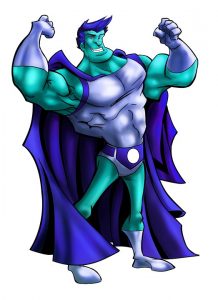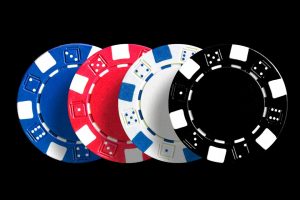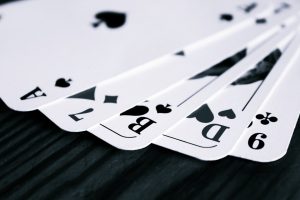 Another well-known feedback error is hero calls. Remember the last time you made such a call with ace high in a big pot. If you were right, you probably felt amazing, even heroic. Winning the pot gave you a huge amount of self-approval, which was amplified every time you showed this call to your friends. But what happens if you call with ace high and lose? Well… For a while, you feel really stupid, especially if you are criticized. But most of the time, you probably think: “I usually beat his bluff, this time he got lucky, he had it. And I still don't know if it was a good call.” Or if he bluffed and beat you, you probably think: “Damn! I knew he was bluffing! Sick!”
Another well-known feedback error is hero calls. Remember the last time you made such a call with ace high in a big pot. If you were right, you probably felt amazing, even heroic. Winning the pot gave you a huge amount of self-approval, which was amplified every time you showed this call to your friends. But what happens if you call with ace high and lose? Well… For a while, you feel really stupid, especially if you are criticized. But most of the time, you probably think: “I usually beat his bluff, this time he got lucky, he had it. And I still don't know if it was a good call.” Or if he bluffed and beat you, you probably think: “Damn! I knew he was bluffing! Sick!”
What I'm about to say may sound untrue, but it is true for many players. Hero calls carry a lot of psychological weight because we glorify them more than other poker hands. It's almost an exception to the normal rules of poker. Therefore, losing with a hero call gets little negative feedback, while winning gets an incredible amount of positive feedback. In scientific terms, you can see how your brain initiates you to make bold hero calls. So, in the end, you don't feel so bad when you lose, and you feel so great when you win. Hero calls introduce us to another feedback imbalance.
What can we do to balance this imbalance? The answer again leads us to self-talk, and here positive self-talk reveals itself in all its beauty. Positivity can encourage behavior that poker itself fails to achieve.
For example, after checking in a big pot on the river and deciding not to fire the last barrel, if the opponent shows the nuts, instead of feeling bad or neutral about his win, you can tell yourself: “Good thing I didn't fire that river bluff. He would have called. I played well.”
You can also do something with hero calls to balance the feedback a bit. First, you can  use negative self-talk (along with educational): “Damn! I shouldn't have made that call. I'll be more careful with hero calls.”
use negative self-talk (along with educational): “Damn! I shouldn't have made that call. I'll be more careful with hero calls.”
Second, you can soften the positive reinforcement after a successful hero call. For example, you can create a rule that you are not allowed to show off your hero call to any of your friends. This would remove most of the psycho-social reinforcement to start with a hero call and help you focus on the best possible play.
Closely related to feedback imbalance is predictive advantage. Predictive advantage shows how much information a certain fact (e.g., a shown hand) reveals about the opponent's game. To make this example simpler, I'll illustrate it from a non-poker perspective.
Let's say you have a full vase of glass marbles. You know there are 100 marbles in total. But there are two possible configurations: either 95 red and 5 blue marbles, or 65 red and 35 blue. You don't know which of these configurations is currently in place, nor any probabilities, but you are allowed to take one marble from the vase. Let's say you draw a marble, and it's red – the predictive advantage is low. This event doesn't tell whether the vase is filled 95% red or 65%. It could easily be either. However, if you draw a blue marble, there is a high predictive advantage, and there is a high probability that the vase is 35% filled with blue.
Talking about marbles, this concept may seem very clear, but in poker, the rush of emotions, noise, and complex circumstances distort the view, and seeing probabilities becomes harder. For example, in a situation where you call with top pair because you think the opponent has the nuts or a missed draw, and he shows the nuts, you are usually very negatively affected: “God, what a fool I am, I should have folded.” Quite often, a nuts showdown is a low predictive advantage event.  The opponent will sometimes have the nuts, whether you thought he was bluffing with his draw or not, and you shouldn't take it too seriously. When your subconscious loses a big pot, it rarely explains it. It just sees that you lost the pot and presses the pain button. Our subconscious processes data very poorly, especially about predictive advantage, so we have to use our consciousness to calibrate our reactions, and even more so our conditioning. So, again, self-talk proves to be a great remedy. By telling yourself: “I knew he could have the nuts, and this doesn't tell me anything about my play, whether I did well or badly.” In this way, we soften the negativity that comes with a lost pot.
The opponent will sometimes have the nuts, whether you thought he was bluffing with his draw or not, and you shouldn't take it too seriously. When your subconscious loses a big pot, it rarely explains it. It just sees that you lost the pot and presses the pain button. Our subconscious processes data very poorly, especially about predictive advantage, so we have to use our consciousness to calibrate our reactions, and even more so our conditioning. So, again, self-talk proves to be a great remedy. By telling yourself: “I knew he could have the nuts, and this doesn't tell me anything about my play, whether I did well or badly.” In this way, we soften the negativity that comes with a lost pot.
We must always be conscious and alert, organizing dialogues in our heads. Eventually, with more practice, your subconscious will learn to interpret such events as predictive advantage, and then they will no longer need to be consciously regulated (in other words, you will reach a level of subconscious competence in it). But until then, you must be strict with your mind's dialogue with yourself and monitor your conditioning. Self-talk is one of the few ways to have control in poker, so you must master this tool as best as you can.
Haseeb Qureshi





